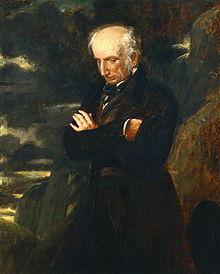Literature
Night Thoughts 42 by Edward Young (1742)

This is the bud of being, the dim dawn,
The twilight of our day, the vestibule;
Life’s theatre as yet is shut, and death,
Strong death, alone can heave the massy bar,
This gross impediment of clay remove,
And make us embryos of existence free.
From real life, but little more remote
Is he, not yet a candidate for light,
The future embryo, slumbering in his sire.
Embryos we must be, till we burst the shell,
Yon ambient azure shell, and spring to life,
The life of gods, O transport! and of man.
Yet man, fool man! here buries all his thoughts;
Inters celestial hopes without one sigh.
Prisoner of earth, and pent beneath the moon,
Here pinions all his wishes; wing’d by heaven
To fly at infinite; and reach it there,
Where seraphs gather immortality,
On life’s fair tree, fast by the throne of God.
What golden joys ambrosial clustering glow
In His full beam, and ripen for the just,
Where momentary ages are no more!
Where time, and pain, and chance, and death, expire!
And is it in the flight of threescore years
To push eternity from human thought,
And smother souls immortal in the dust?
A soul immortal, spending all her fires,
Wasting her strength in strenuous idleness
Thrown into tumult, raptured, or alarm’d,
At aught this scene can threaten or indulge,
Resembles ocean into tempest wrought,
To waft a feather, or to drown a fly.
Where falls this censure? It o’erwhelms myself;
How was my heart encrusted by the world!
O how self-fetter’d was my grovelling soul!
How, like a worm, was I wrapt round and round
In silken thought, which reptile fancy spun,
Till darken’d reason lay quite clouded o’er
With soft conceit of endless comfort here,
Nor yet put forth her wings to reach the skies!
The Mad Mother 43 by William Wordsworth (1798)

William Woodsworth was an individual that believed the mind and external world are fitted. Together they created their own meaning, yet separately have resonance. He claimed nature is a testimony of God, that the natural world was more important than self exploration. “He sought images of alienated life, which he could see and present as images of natural communion. The natural man, free of consciousness in any of our senses. The hiding places of man’s power are in his past, in childhood. The poet of naturalism, separated by organic growth from his own past, looks around him and sees the moving emblems of a childlike consciousness in the mad, the outcast, and the dreadfully old” 26. In the poem below, Woodsworth delves into the life of a mother who captured her young child and is running away from her spouse. Her insanity overtook her right mental state and the love she feels from her child is something she never wants to lose, and something her spouse could never provide.
Her eyes are wild, her head is bare,
The sun has burnt her coal-black hair,
Her eye-brows have a rusty stain,
And she came far from over the main.
She has a baby on her arm,
Or else she were alone;
And underneath the hay-stack warm,
And on the green-wood stone,
She talked and sung the woods among;
And it was in the English tongue.
A fire was once within my brain;
And in my head a dull, dull pain;
And fiendish faces one, two, three,
Hung at my breasts, and pulled at me.
But then there came a sight of joy;
It came at once to do me good;
I waked, and saw my little boy,
My little boy of flesh and blood;
Oh joy for me that sight to see!
For he was here, and only he.
Suck, little babe, oh suck again!
It cools my blood; it cools my brain;
Thy lips I feel them, baby! they
Draw from my heart the pain away.
Oh! press me with thy little hand;
It loosens something at my chest;
About that tight and deadly band
I feel thy little fingers press'd.
The breeze I see is in the tree;
It comes to cool my babe and me.
Oh! love me, love me, little boy!
Thou art thy mother's only joy;
And do not dread the waves below,
When o'er the sea-rock's edge we go;
The high crag cannot work me harm,
Nor leaping torrents when they howl;
The babe I carry on my arm,
He saves for me my precious soul;
Then happy lie, for blest am I;
Without me my sweet babe would die.